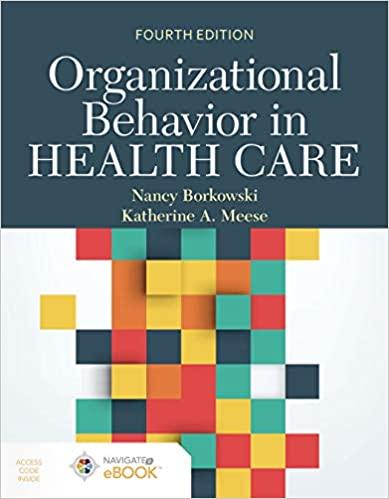Scott is a licensed physical therapist who works for a national rehabilitation company. The rehabilitation facility in
Question:
Scott is a licensed physical therapist who works for a national rehabilitation company. The rehabilitation facility in which Scott works is located in an urban Southwest city. He has worked at this facility for 4 years and, up until recently, was satisfied with his working environment and the interactions he shared with his coworkers. In addition, Scott received personal fulfillment from helping his patients recover from their disabilities and seeing them return to productive lives.
Last year the health system went through reorganization, with some new people being brought in and others reassigned. Scott’s new boss, George, was transferred from one of the system’s Midwest facilities.
Almost immediately upon taking his new position, George began finding fault with Scott’s care plans, patient interactions, and so on. Scott began feeling as if he couldn’t do anything right. He was experiencing feelings of anxiety, stress, and self-blame. Although his previous performance evaluations had been above average, Scott was shocked by his first performance review under George’s authority—it was an extremely low rating.
Scott began trying to work harder, thinking that by working harder he could exceed George’s expectations. Despite Scott’s long hours and addressing George’s critiques, George continued to find fault with Scott’s work. Staff meetings began to be a great source of discomfort and stress because George would belittle Scott and single him out in front of his colleagues.
Scott began to feel alienated from his family, friends, and colleagues at work. His eating and sleeping habits were adversely affected as well. Scott’s activities held no joy for him any more, and the career that he had once loved and been respected in became a source of pain and stress. He began to call in sick more often and started visualizing himself confronting and even hurting George, which created even more guilt and anxiety for Scott.
As time went on, George encouraged Scott’s coworkers to leave Scott alone to do his work. The perception of the coworkers became more sympathetic to George’s point of view. Scott’s coworkers mused that perhaps Scott really was a poor worker and that George knew better because of his position as the supervisor of the rehabilitation department. Eventually, Scott’s coworkers began to distance themselves from him, in order to protect their own interests. They began to see Scott as an outsider, with whom it was unsafe to associate.
In an effort to resolve the situation, Scott spoke to George directly, stating his feelings and expressing an interest in how they might improve the situation. Rather than making the situation better, what George perceived as Scott’s insubordination served to enrage George, and the personal attacks against Scott intensified. Feeling frustrated and helpless, Scott then decided to take his problem to the Human Resources Department (HRD). A human resources manager listened to Scott’s complaints and suggested that Scott return with documented evidence of what Scott perceived to be George’s mistreatment. In an effort to help ease the situation, the HRD manager discussed the issue with George, which only stirred the flames of George’s anger and his negative behavior toward Scott.
As a last resort, Scott decided to go to George’s boss, Rebecca. Rebecca met with George to get his side of the story. George portrayed Scott as an unproductive employee with no respect for authority. The result was a strong letter of reprimand in Scott’s file for insubordination.
Describe French and Raven’s five sources of power. What power(s) do the individuals in Scott’s dilemma hold?
Step by Step Answer:

Organizational Behavior In Health Care
ISBN: 9781284183245
4th Edition
Authors: Nancy Borkowski, Katherine A. Meese





